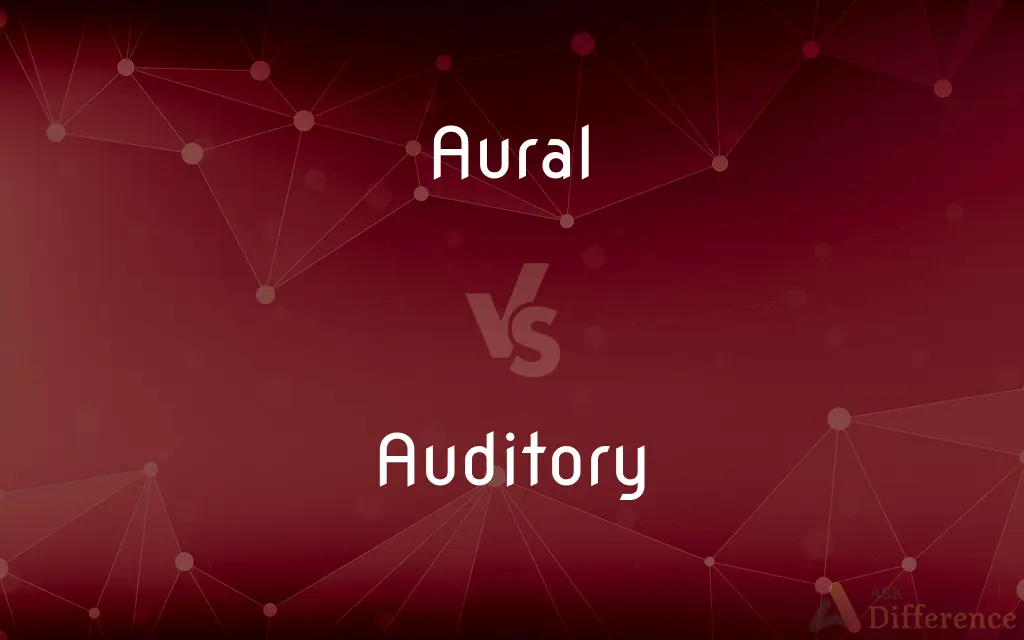Aural vs. Auditory — What's the Difference?
By Tayyaba Rehman & Urooj Arif — Updated on March 27, 2024
Aural relates to hearing or the ear, emphasizing the experience or perception of sound, while auditory refers specifically to the sense or organs of hearing, focusing on physiological aspects.

Difference Between Aural and Auditory
Table of Contents
ADVERTISEMENT
Key Differences
Aural pertains to the experience of hearing or the sense of sound, often emphasizing the subjective, experiential aspect of sound perception. This includes how we interpret and emotionally respond to sounds. On the other hand, auditory specifically relates to the physiological and anatomical components of hearing, such as the ears and the auditory system, focusing on the mechanisms that enable sound perception.
When discussing learning styles or preferences, "aural" learners are those who learn best through hearing, such as through lectures or discussions. This term highlights the experiential and interpretative nature of their learning process. Conversely, references to "auditory" learning or processing might focus more on the biological or neurological aspects of how sound is received and processed by the brain, underscoring the scientific understanding of hearing.
In the context of health and medicine, aural health might refer to the overall well-being and condition of a person's ears and their ability to perceive sound. This encompasses everything from the health of the ear drum to the inner ear's functioning. Auditory health, while closely related, might be used more specifically to discuss the functionality of the auditory system, including diagnosing and treating hearing impairments.
In music and sound design, aural skills refer to the ability to identify, understand, and express music through listening. This includes skills like pitch recognition and rhythm identification. Auditory skills, in this realm, could refer more to the physiological ability to hear sounds without necessarily implying a developed musical or sound interpretative capability.
Technological developments also reflect these distinctions. Aural technologies might refer to innovations designed to enhance the listening experience, such as spatial audio in headphones, emphasizing how sound is experienced. Auditory technologies might be those that aid or enhance the physiological process of hearing itself, such as hearing aids or devices that map sounds to other sensory modalities for the hearing impaired.
ADVERTISEMENT
Comparison Chart
Definition
Relating to the ear or sense of hearing, emphasizing experience and perception.
Pertaining to the sense or organs of hearing, focusing on physiological aspects.
Focus
Experiential and interpretative aspect of sound.
Biological and neurological aspects of hearing.
Contexts
Learning styles, music and sound design, subjective experience of sound.
Health and medicine, anatomical study, hearing function and impairments.
Health and Medicine
Overall ear health and sound perception.
Functionality and health of the auditory system.
Learning and Education
Style or preference for receiving information through sound.
Study of how the brain processes auditory information.
Technology
Enhancements to listening experience (e.g., spatial audio).
Devices aiding hearing function (e.g., hearing aids).
Compare with Definitions
Aural
Concerned with the health of the ear.
Regular check-ups are important for aural health.
Auditory
Used to describe technological aids for hearing.
Auditory devices like hearing aids are crucial for some.
Aural
Involving the sense of hearing in learning.
Aural learners prefer podcasts over textbooks.
Auditory
In reference to educational methods that use hearing.
Auditory learning techniques are effective for many students.
Aural
Pertaining to hearing or the ear, with a focus on perception.
The aural experience of the concert was unforgettable.
Auditory
Concerning the organs involved in hearing.
The study focused on the auditory system's response to different frequencies.
Aural
Related to sound quality or experience.
The aural texture of the piece is complex and rich.
Auditory
Pertaining to the analysis of sound perception by the brain.
Auditory processing disorders affect how sound is interpreted.
Aural
Refers to skills in identifying and interpreting sounds.
Musicians often have excellent aural skills.
Auditory
Relating to the physiological aspect of hearing.
Auditory nerves transmit sound signals to the brain.
Aural
Relating to the ear or the sense of hearing
Information held in written, aural, or visual form
Aural anatomy
Auditory
Relating to the sense of hearing
The auditory nerves
Teaching methods use both visual and auditory stimulation
Aural
Of, relating to, or perceived by the ear.
Auditory
Of or relating to hearing, the organs of hearing, or the sense of hearing.
Aural
Characterized by or relating to an aura.
Auditory
Of, or relating to hearing, or to the sense or organs of hearing.
Aural
Of or pertaining to the ear.
Auditory
(archaic) audience.
Aural
Of or pertaining to sound.
Auditory
(archaic) auditorium.
Aural
Of or pertaining to an aura.
Auditory
Of or pertaining to hearing, or to the sense or organs of hearing; as, the auditory nerve. See Ear.
Aural
Of or pertaining to the air, or to an aura.
Auditory
An assembly of hearers; an audience.
Aural
Of or pertaining to the ear; as, aural medicine and surgery.
Auditory
An auditorium.
Aural
Of or pertaining to hearing or the ear;
An animal with a very sensitive aural apparatus
Auditory
Of or relating to the process of hearing;
Auditory processing
An audile person
Aural
Relating to or characterized by an aura;
Various aural effects that precede a migraine headache
Common Curiosities
Can someone have good auditory but poor aural abilities?
Yes, a person might have a good physiological capacity to hear (auditory) but struggle with interpreting or understanding sounds (aural).
What is the main difference between aural and auditory?
Aural focuses on the experience and perception of hearing, while auditory relates to the physiological aspects of hearing.
How do aural learning and auditory learning differ?
Aural learning emphasizes learning through the experience of hearing, while auditory learning may focus more on the neurological aspects of processing sounds.
Are aural skills important for musicians?
Absolutely, aural skills are crucial for musicians as they involve the ability to recognize pitches, rhythms, and musical textures by ear.
How can auditory impairments affect aural experiences?
Auditory impairments can diminish the quality or range of sounds a person can hear, impacting their aural experiences negatively.
Are there technologies that assist with both aural and auditory needs?
Yes, technologies like hearing aids assist with auditory needs by amplifying sound, thereby also enhancing aural experiences.
Is auditory training effective for everyone?
While effective for many, its success can vary depending on individual auditory processing capabilities and specific impairments.
What does auditory health entail?
Auditory health involves the health of the hearing organs and the auditory system's overall functionality.
What are examples of aural experiences?
Listening to music, hearing someone's voice, or experiencing the sounds of nature are all examples of aural experiences.
Can auditory and aural skills affect language acquisition?
Yes, both sets of skills are crucial for language development, affecting how sounds are heard, interpreted, and reproduced.
What educational strategies benefit aural learners?
Strategies that involve listening, such as lectures, audio books, and group discussions, benefit aural learners.
Can aural skills be developed?
Yes, through practice and training, individuals can improve their ability to perceive and understand sounds more accurately.
How do aural perceptions influence music appreciation?
Aural perceptions directly influence how we interpret and emotionally connect with music, shaping our overall appreciation.
What role do auditory nerves play?
Auditory nerves transmit sound information from the ear to the brain, playing a crucial role in how we hear.
How is auditory processing disorder diagnosed?
It's typically diagnosed through specialized auditory tests that assess how well the brain processes sound.
Share Your Discovery

Previous Comparison
Fervour vs. Zeal
Next Comparison
Repartee vs. BanterAuthor Spotlight
Written by
Tayyaba RehmanTayyaba Rehman is a distinguished writer, currently serving as a primary contributor to askdifference.com. As a researcher in semantics and etymology, Tayyaba's passion for the complexity of languages and their distinctions has found a perfect home on the platform. Tayyaba delves into the intricacies of language, distinguishing between commonly confused words and phrases, thereby providing clarity for readers worldwide.
Co-written by
Urooj ArifUrooj is a skilled content writer at Ask Difference, known for her exceptional ability to simplify complex topics into engaging and informative content. With a passion for research and a flair for clear, concise writing, she consistently delivers articles that resonate with our diverse audience.














































